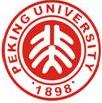工业工程与管理系学术报告9.16(报告人 Gao Jia 教授)
发布时间: 2009-09-14 03:51:00
SEMINAR SERIES
北京大学工学院 
![]() 力学与空天技术系
力学与空天技术系

湍流与复杂系统国家重点实验室
报告人 Gao Jia 教授
Center for Complex Systems, Department of Automatic Control Engineering, Xidian University
主持人:王龙 教授
时 间:9月16日(周三)下午2:30
地 点:湍流实验室会议室
报告内容摘要:
Public goods game has been applied as a standard paradigm for the study of cooperation in social economical systems. In most previous studies of public goods game, individuals customarily donate their contributions averagely to games they participate in. We develop an extended public goods game model, in which individuals distribute their contributions based on the groups' qualities. Typically, individuals shall invest the higher fraction of its contribution to the groups of the superior qualities, representing individuals' trait that they prefer better environments but expel nasty ones. The quality of a group is positively correlated with its cooperation level in previous generation. Numerical simulations show that the system with high-quality preference mechanism can greatly improve cooperation, compared with usual averagely donate system. Investigation of wealth distribution reveals the fraction of the wealth cooperators possessed appreciate with the increase of preferential extent when cooperators constitute the same fraction of the population. Our work may offer some help to understanding the evolution of cooperation in realistic world.
欢迎广大老师和学生参加!
<span styletimes="" new="" roman';="" mso-hansi-font-family:="" 'times="" mso-ansi-language:="" en-us;="" mso-fareast-language:="" zh-cn;="" mso-bidi-language:="" ar-sa;="" mso-ascii-font-family:="" roman'"=""><span styletimes="" new="" roman';="" font-size:="" 15pt;="" mso-font-kerning:="" 1.0pt;="" mso-fareast-font-family:="" 宋体;="" mso-ansi-language:="" en-us;="" mso-fareast-language:="" zh-cn;="" mso-bidi-language:="" ar-sa"="" lang="EN-US">